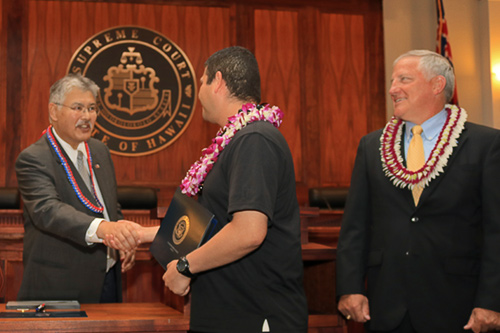Oahu Veterans Treatment Court Celebrates 22 Successful Graduates
Posted on Jan 13, 2017 in Featured News
First Circuit Veterans Treatment Court Presiding Judge Edward H. Kubo, Jr. (left) congratulates a veteran of the program’s January 2017 graduating class. U.S. Army Lieutenant Colonel (Ret.) Matthew K.H. McCarville, an Associate Vice President at Morgan Stanley Wealth Management (right), served as the distinguished speaker for the First Circuit Veterans Treatment Court’s fourth graduation ceremony on January 13, 2017.
The Veterans Treatment Court of the First Circuit (Oahu) held its fourth graduation ceremony on January 13, 2017. Friends and supporters gathered in the Supreme Court courtroom to congratulate the six U.S. veterans who graduated from the intensive two-year program.
Twenty-two veterans have now successfully completed the First Circuit program since it was initiated by Judge Edward Kubo in 2013. Over the past four years an increasing number of attorneys have heard about the Veterans Treatment Court and submitted applications for their clients to be referred to the program. Hawaii now has Veterans Treatment Courts on both Oahu and Hawaii Island (Third Circuit).
Soldiers returning from war have demonstrably higher rates of co-occurring posttraumatic stress disorder (PTSD), traumatic brain injury, pain, and substance use disorders (SUDs) than the general population. Often, these issues are compounded by family strife, unemployment, and homelessness, ultimately leading to incarceration.
A 2016 study published by the Community Mental Health Journal found that veterans who participate in veterans treatment courts experience significant improvement in housing, relationships and social connection, overall functioning and well-being, depression, PTSD, substance abuse, and mental and emotional health.
The Veterans Treatment Court takes a holistic approach to helping veterans by providing them with the resources and treatment they need to regain their health, obtain steady employment, and return to being law-abiding citizens so they may enjoy the freedoms they helped protect.
Each program participant has undergone extensive treatment and counseling, which includes frequent urinalysis, meetings with probation officers, and court appearances. Many of the services rendered to these veterans were provided by the U.S. Department of Veterans Affairs (VA) at no cost to the state of Hawaii.
Participants have also been assisted with finding housing and employment. Their graduation celebrates their success in achieving a clean and sober lifestyle and a chance for a successful future with a job and other opportunities.
“I’d like to thank the staff from the U.S. Vets and Sand Island Treatment Center for their role in Veterans Treatment Court,” said Judge Edward Kubo. “I’d like to also recognize the volunteer veteran mentors, who are an integral part of this program’s success. These men and women understand the difficulties our program participants are facing, and walk alongside them throughout the process of recovery. Veterans Treatment Court is a team effort, and that’s what changes lives.”
